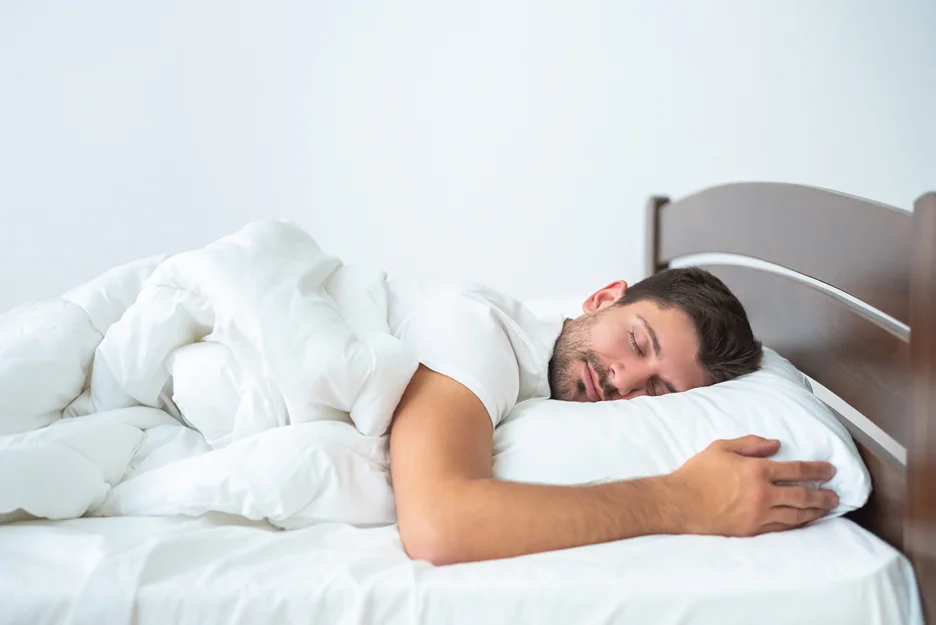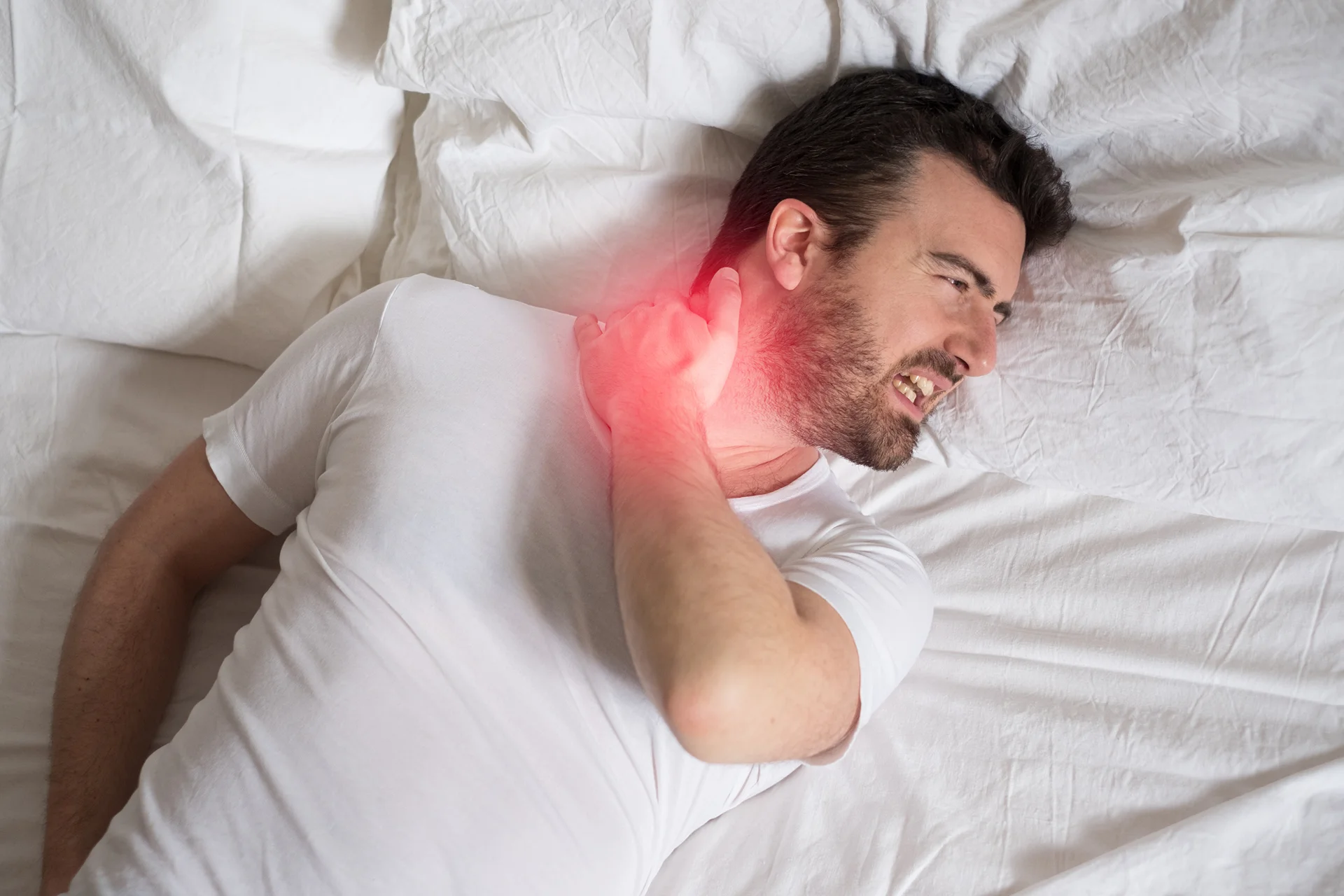Waking up with a stiff, sore neck can really put a crick in your day. Those first morning stretches are accompanied by sharp pangs in your neck as you try to lift your head from the pillow.
Every turn of your head brings new twinges of pain. You gingerly rub the back of your neck, wondering – why does my neck hurt after sleeping?
Unfortunately, this is a common complaint for many people. The way you sleep directly impacts the health and alignment of your cervical spine and neck.
Poor sleeping positions or habits can lead to muscle tightness, strain, and even pinched nerves. Understanding what causes neck pain after sleeping and how to prevent it can help you wake up comfortably and restored.
What Causes Neck Pain After Sleeping?
There are several factors that can contribute to waking up with neck pain:
Sleeping in Awkward Positions
Sleep position that twists, over-extends, or compresses your neck can lead to painful muscle spasms, stiffness, and decreased range of motion upon waking up. Common examples include:
- Sleeping on your stomach with your neck sharply turned to the side
- Curling up too tightly in a fetal position which crunches the neck forward
- Letting your head hang off the edge of the bed which hyperextends the neck
- Having your arms above your head which pulls the neck out of alignment
Try to maintain your neck in a comfortable and neutral position when sleeping to avoid straining the muscles and cervical spine.
Using the Wrong Pillows
Your firm pillow provides support for your head and neck during sleep. The ideal pillow keeps your neck aligned with your spine when lying on your back or side.
Pillows that are too low or too high force the neck out of proper alignment and put stress on the cervical joints and muscles. This can lead to waking up with neck aches and a reduced range of motion.
Sleep Disorders Like Insomnia
Chronic insomnia or sleep apnea results in disrupted, poor-quality sleep. Tossing and turning frequently through the night strains neck muscles and the cervical spine. Lack of deep REM sleep prevents the body from fully relaxing and recovering, causing you to wake up with lingering muscle tightness and soreness.
Treating underlying sleep disorders can improve sleep quality and help reduce neck discomfort.
Medical Conditions Affecting the Neck
Some medical conditions that affect the cervical spine can worsen neck pain at night. These include:
- Herniated discs in the neck which press on nerves
- Arthritis in the cervical spine causing inflammation
- Pinched nerves which result in radiating neck and arm pain
Managing the medical condition through treatment can alleviate associated neck pain after sleeping.
Common Symptoms and Risk Factors
How do you know if you’re waking up with neck pain versus a regular stiff neck? Here are some of the most common symptoms and risk factors to watch out for:
Stiffness and Soreness in the Neck
You almost can’t lift or turn your head when you wake up because your neck feels so stiff and painful. Looking side to side or up and down brings sharp muscle spasms. The discomfort lingers throughout the morning.
Numbness or Tingling
You wake up with numbness, tingling, or a pins-and-needles sensation down one or both arms. This indicates potential nerve compression in the neck which should be evaluated by a doctor.
Tossing and Turning at Night
You had a restless night sleep with frequent tossing and turning. Changing positions to get comfortable strains the neck muscles resulting in morning soreness.
Age and Previous Injuries
Middle-aged and elderly individuals are at higher risk for neck pain after sleeping due to age-related wear and tear. Previous neck injuries also increase susceptibility.
Obesity
Excess weight puts more strain on the neck both when sleeping and awake leading to increased pain after sleeping.
Arthritis
Degenerative forms of arthritis like cervical spondylosis make the cervical joints more prone to damage from awkward sleeping positions.
How to Prevent Neck Pain After Sleeping

Using proper sleep posture and support for your neck is key to preventing those stiff, painful mornings. Here are some tips:
Choose the Right Pillow
Invest in a high-quality cervical or memory foam pillow that supports the natural curve of your neck.
The cervical pillow should keep your head level with your body when lying on your back. Side sleepers need a slightly higher loft pillow to fill the space between the ear and shoulder.
Try different pillows to find the right thickness, firmness, and material for your preferred sleeping position. Replace old lumpy pillows.
Maintain Proper Sleeping Posture
Avoid sleeping in positions that hyperextend, sharply turn, or bend your neck which strains the cervical spine:
- Don’t sleep on the stomach – keep the neck neutrally aligned even if you need to prop a body pillow under the torso.
- When side sleeping, keep the neck and spine straight – avoid curling up tightly in a fetal position.
- If you are a back sleeper, put a slim pillow under the knees to prevent the neck from bending forward.
Do Neck Strengthening Exercises
Perform simple neck stretches and regular exercises in the morning and evening to keep the cervical muscles flexible and strong. This helps compensate for any strain experienced during sleep. Try chin tucks, shoulder shrugs, and gentle neck rotations.
Improve Sleep Habits
Get sufficient sleep each night and improve your overall sleep hygiene. Avoid caffeine late in the day, limit alcohol, stick to a regular sleep-wake schedule, and make your bedroom comfortable for sleep. Manage any underlying sleep disorders.
Monitor Positions When Awake
Reduce neck strain during the day by avoiding slouching, holding the phone to your ear, and hunching over desks or devices. Take frequent breaks at work. These habits compound any neck stress from sleeping.
When to See a Doctor for Neck Pain After Sleeping
Mild to moderate neck pain that develops after sleeping incorrectly is usually not a major concern and often resolves within a few days. Try improving your sleep habits, posture, and pillow support. Over-the-counter pain medication like NSAIDs can provide pain relief.
You should make an appointment with your doctor if:
- Neck pain persists for more than 1 week
- Pain is severe and limits your ability to move your head and neck
- You experience numbness, tingling, or weakness in the shoulder, arm or hand
- Neck pain occurs with other symptoms like headache, nausea, fever
These may indicate an underlying medical condition or injury like a herniated disc, pinched nerve, or other cervical spine problem. Prompt medical evaluation is recommended.
Your doctor will ask about your symptoms, risk factors, and perform a physical exam of the neck. Imaging tests like X-rays or MRIs of the cervical spine may be ordered. Diagnosing any underlying condition causing the neck pain guides appropriate treatment.
Treatment Options for Neck Pain After Sleeping
How your neck pain after sleeping is treated depends on the cause and severity. Here are some of the most common treatment approaches:
Over-the-Counter Medications
Anti-inflammatories like ibuprofen or naproxen can provide short-term relief from muscular neck pain and soreness after sleeping wrong. Topical muscle rubs may also ease symptoms.
Physical Therapy
Specific neck stretches, exercises and manual techniques done by a physical therapist can help improve the range of motion and strength of the cervical spine. Ultrasound, electric stimulation, and hot packs may provide additional relief from neck pain.
Heat and Cold Therapy
Applying heat or cold can help relieve neck pain and muscle tightness after sleeping in an awkward position.
- Heat therapy increases blood flow, loosens tight muscles, and reduces sharp pain. Options include warm compresses, heating pads, warm showers, and heat packs. Use for 15-20 minutes before activity.
- Cold therapy numbs pain and reduces inflammation. Ice packs, cold massages, or cool compresses can be applied for 10-15 minutes several times a day. Use cold therapy after physical activity or injury to minimize swelling.
Alternating heat and ice therapy provides both pain-relieving and anti-inflammatory benefits for sleeping-related neck aches. Avoid direct heat or ice contact with the skin to prevent damage. Consult a healthcare professional on appropriate therapy for your condition.
Chiropractic Care
Chiropractors use neck and spine adjustments and manipulations to improve the alignment of the cervical vertebrae. They may incorporate massage, heat therapy, and gentle exercise recommendations as well.
Prescription Medications
For severe neck pain after sleeping, doctors may prescribe muscle relaxants or even steroid injections to reduce inflammation and spasms. Narcotic pain relievers are rarely used.
Surgery
This is only considered for serious medical issues like a herniated disc causing compressed nerves or spinal instability from injury or advanced arthritis. Typical sleeping-related neck pain does not require surgery.
Alternative Therapies
Options like massage, acupuncture, mindfulness, and yoga may help relieve muscular tension, increase circulation, and reduce stress contributing to neck discomfort after poor sleep.
FAQs about Neck Pain After Sleeping
Why do I wake up with a stiff neck after sleeping?
A stiff neck in the morning is often the result of sleeping in an awkward position or using a pillow that doesn’t support the natural curve of your cervical spine. It’s also possible that pre-existing neck issues or muscle strain from the day’s strenuous activities contribute to this discomfort.
How do different sleeping positions affect neck pain?
Sleeping positions play a vital role in maintaining the neutral position of the cervical spine. For instance, back sleeping generally helps in maintaining the spine’s natural curve, but without a supportive pillow, it can cause issues.
Side sleeping can be beneficial, but it’s crucial to have a pillow that keeps the head aligned with the spine. Stomach sleeping is typically discouraged as it forces the neck into an extended rotation.
What type of pillow is recommended to avoid neck pain?
The ideal pillow can vary based on personal preference, but cervical pillows, memory foam pillows, or firm pillows are commonly suggested by healthcare providers to maintain the neck’s natural curve. Pillows that are too high or too low can push your neck into an awkward position, leading to muscle strain.
Can physical activity help in alleviating neck pain after sleeping?
Absolutely! Regular exercise, especially gentle exercises focusing on neck muscles, can be beneficial. It strengthens the muscles, increases flexibility, and reduces the risk of pain. Consider consulting with a physical therapist for exercises tailored to your needs.
When should I see a healthcare provider for my neck pain?
If your neck pain persists for an extended period, is accompanied by other symptoms like numbness or sharp pain, or is the result of an injury, it’s essential to consult a healthcare professional. Chronic neck pain can indicate underlying issues that may need specialized care.
Achieving Restful, Pain-Free Sleep
The key is being proactive about neck support and positioning during sleep to avoid causing strain and pain. Evaluate your pillow height and firmness as well as your sleeping posture. Improve sleep hygiene.
See a doctor if severe or persistent neck pain arises so the cause can be properly diagnosed and managed. With some adjustments to your sleep environment and habits, you’ll wake up feeling refreshed and ready to start the day.
Finding Relief for Neck Pain After Sleeping

If you’re tired of waking up with stiff, painful neck muscles after a night of poor sleeping posture, it may be time to seek professional help. Kaly connects you to licensed doctors for online telemedicine visits so you can get your neck pain evaluated and treated from the comfort of your home.
Their network of verified physicians includes orthopedic surgeons, neurologists, chiropractors, physical therapists, and pain medicine specialists who can assess your symptoms, order imaging if needed, and provide tailored treatment plans.
On Kaly’s secure platform, you can find experts trained in diagnosing and managing all types of neck pain and spinal conditions. Schedule a virtual appointment and take control of your neck health today.
